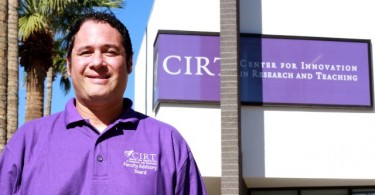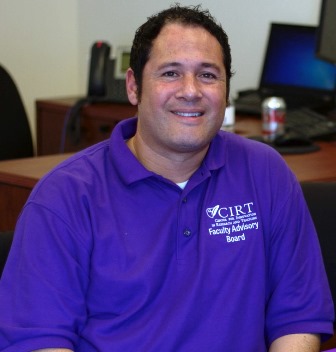By Cooper Nelson
GCU News Bureau
Grand Canyon University online professors are asked to call students a week before the start of their courses to introduce themselves and ease students into the often daunting online classroom.
John Steele, an online professor in the College of Humanities and Social Sciences, goes beyond that, sometimes calling two weeks in advance and staying in contact throughout the course. But Steele doesn’t see it as overachieving — he’s simply doing his job.
Steele, who has taught online courses for four years, earned online master’s degrees in education and psychology from GCU. His campus ties run deep: He is pursuing an online doctorate in general psychology, is a men’s basketball season-ticket holder and volunteers at Welcome Week and local outreach events. Steele shares his personal connections to campus with his students to help them feel part of a place many have never seen.
Steele, 37, understands the difficulty of juggling online classes and busy schedules and takes pride in guiding students early in their degree programs. Many of his students are working adults with little online experience.
“What online instructors need to do is connect to students and let them know who we are, more as people first, rather than as instructors,” said Steele, who teaches entry-level courses in philosophy, university success and critical thinking.
“When you’re in the classroom and you’ve been on both sides, being the teacher and the student, it helps. One of the biggest things I try to do is be compassionate and understanding.”
Steele was selected by his peers to represent the University’s online faculty at Online Student and Faculty Appreciation Night during Saturday’s men’s basketball game against New Mexico State in GCU Arena. Steele and three online students will join GCU academic counselors and other online learners at a pregame gathering and share their stories of success.
Though soft-spoken and reserved, Steele is praised by his colleagues and students for his dedication to his students’ achievements in and out of the classroom. He has a number of emails from current and former students thanking him for helping them overcome roadblocks and succeed.
“I like what I do. I like teaching the introductory classes and helping students early on,” Steele said. “I might teach someone who this is their first semester in school for 20 years. A lot of them just need support.”
A teacher, mentor and friend
GCU freshman Lori James said Steele changed her perspective on online learning.
James, 42, has bipolar disorder and struggled in her first two online classes before enrolling in Steele’s philosophy course. She had trouble navigating the online classroom and often forgot to include all aspects of her assignments.
She called Steele three weeks before her course began and disclosed the nature of her disorder. James, who now is in the final week of the class, talked to Steele weekly. He offered guidance and helped her understand the more tedious assignments. She enjoyed the class so much, she asked her academic counselor to move her into another of his courses.
“I’d be lying if I didn’t (say I'd) call him 20 times the first week,” said James, a Florida resident who is pursuing a bachelor’s in counseling.
“He makes you want to learn. When I first started this course I wasn’t very excited, but John changed that,” she said. “It can be difficult for me, but he has really made studying online a positive experience.”
Babyann Hernandez, a freshman in Steele’s UNV 101 course, had a similar experience.
Hernandez missed a majority of the course while ill, but she was able to pass with help from Steele. She thanked him in a journal article reflection that described her takeaways from the class.
“He restored my motivation by being there and listening to me …” Hernandez wrote. “… He simply reminded me, even when I feel like giving up, to keep going and that someone out there understands and cares, someone out there will help show you or remind you what you’re capable of.”
Improving online learning
In addition to focusing his attention on students’ success, Steele has led multiple initiatives to improve GCU online education. He is a member of GCU’s plagiarism taskforce and is an online faculty representative on the Center for Innovation in Research and Teaching advisory board. He has given talks on integrating technology into the online classroom, co-authored articles on using technology to gauge student learning and written sections of the philosophy textbook used in GCU courses.
Tom Dyer, an online professor in Peoria who helped write the journal article and textbook chapters, has worked with Steele for three years and said he is constantly learning from his teaching style.
“He’s just a workhorse,” Dyer said. “He puts in the extra time to have other people succeed. He doesn’t seem to have a limit to what he can achieve.”
Rick Holbeck, director of online full-time faculty at GCU, works closely with Steele on the CIRT advisory board and helped lead the charge to select Steele for the award. Steele was an easy choice, Holbeck said.
“John’s really active in improving the online classroom, and anybody can do that, but I feel like he is just intrinsically motivated to help others,” he said. “All of our professors have a desire to help students, but it seems like John naturally enjoys seeing our students succeed.”
Contact Cooper Nelson at 602-639-7511 or [email protected].






































































